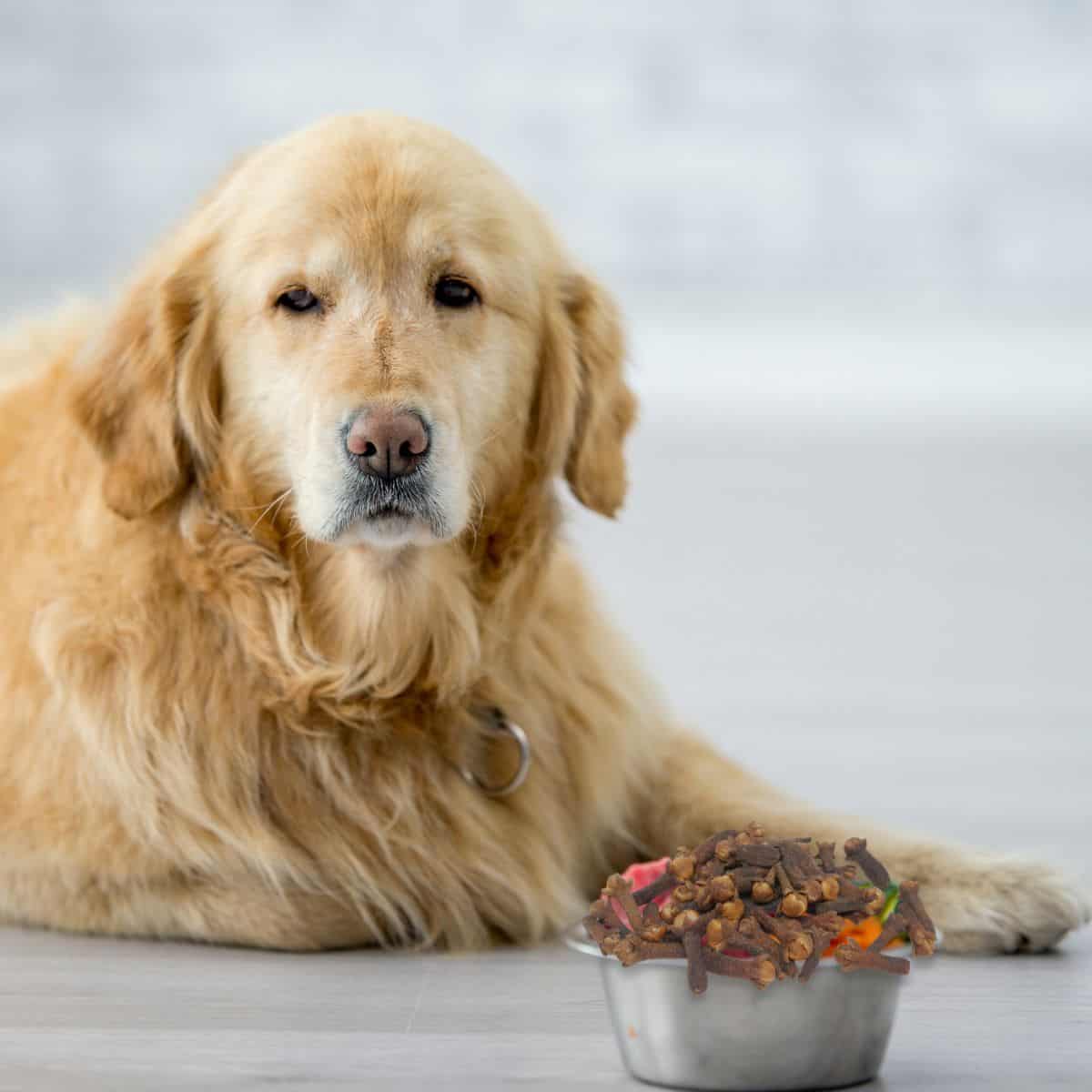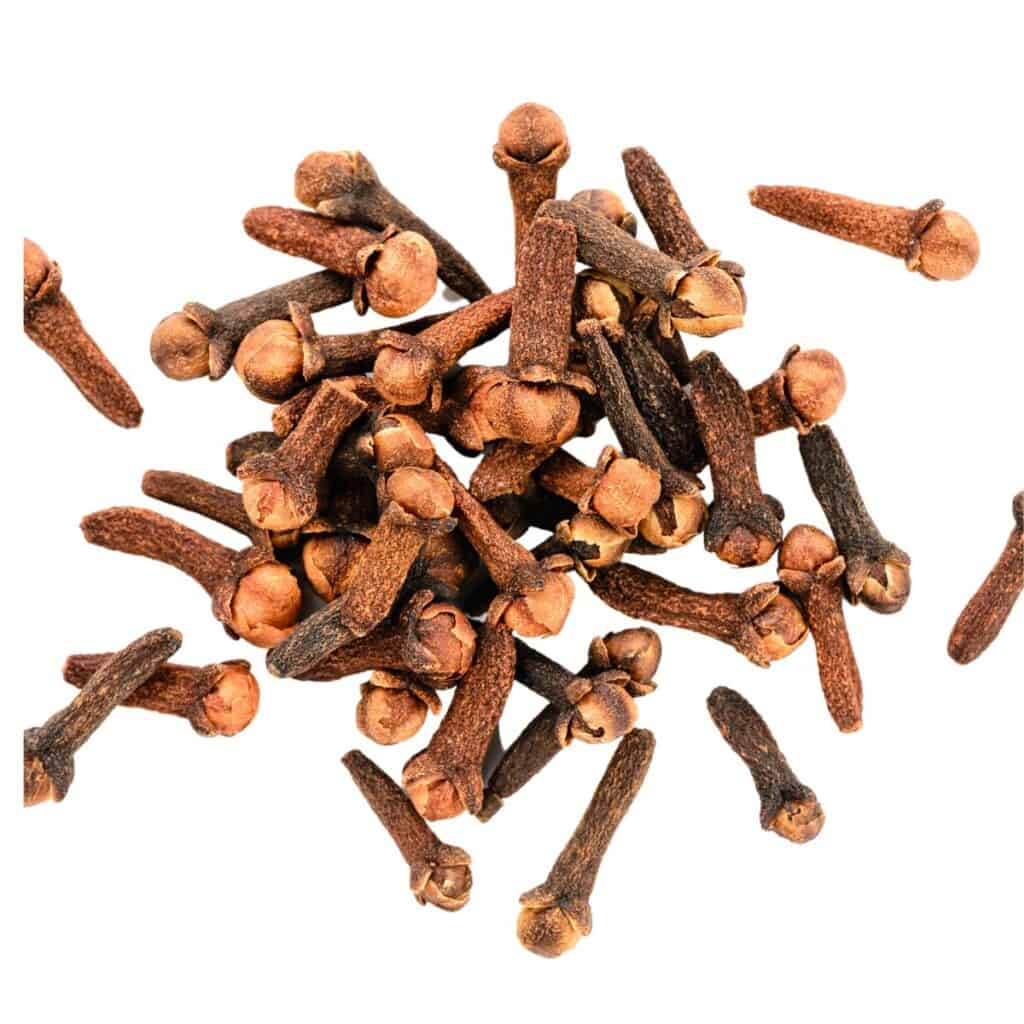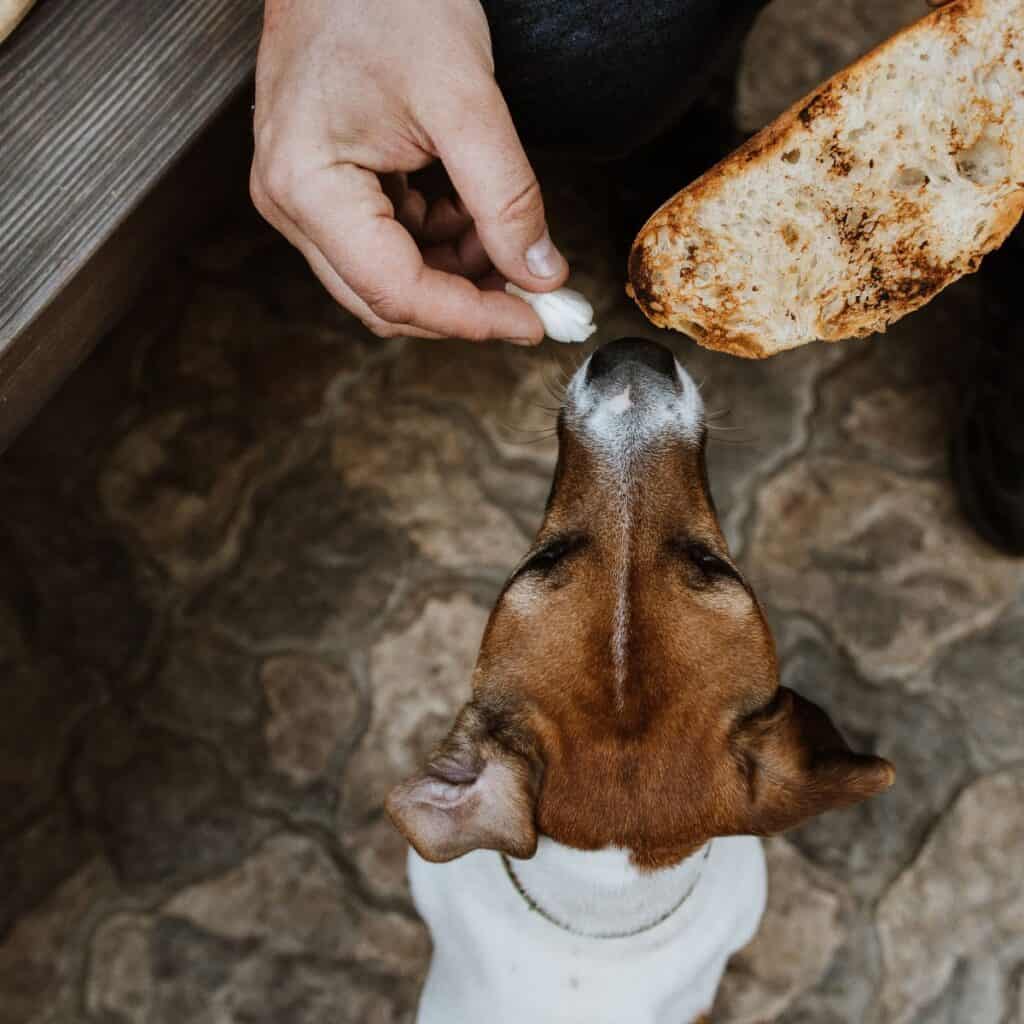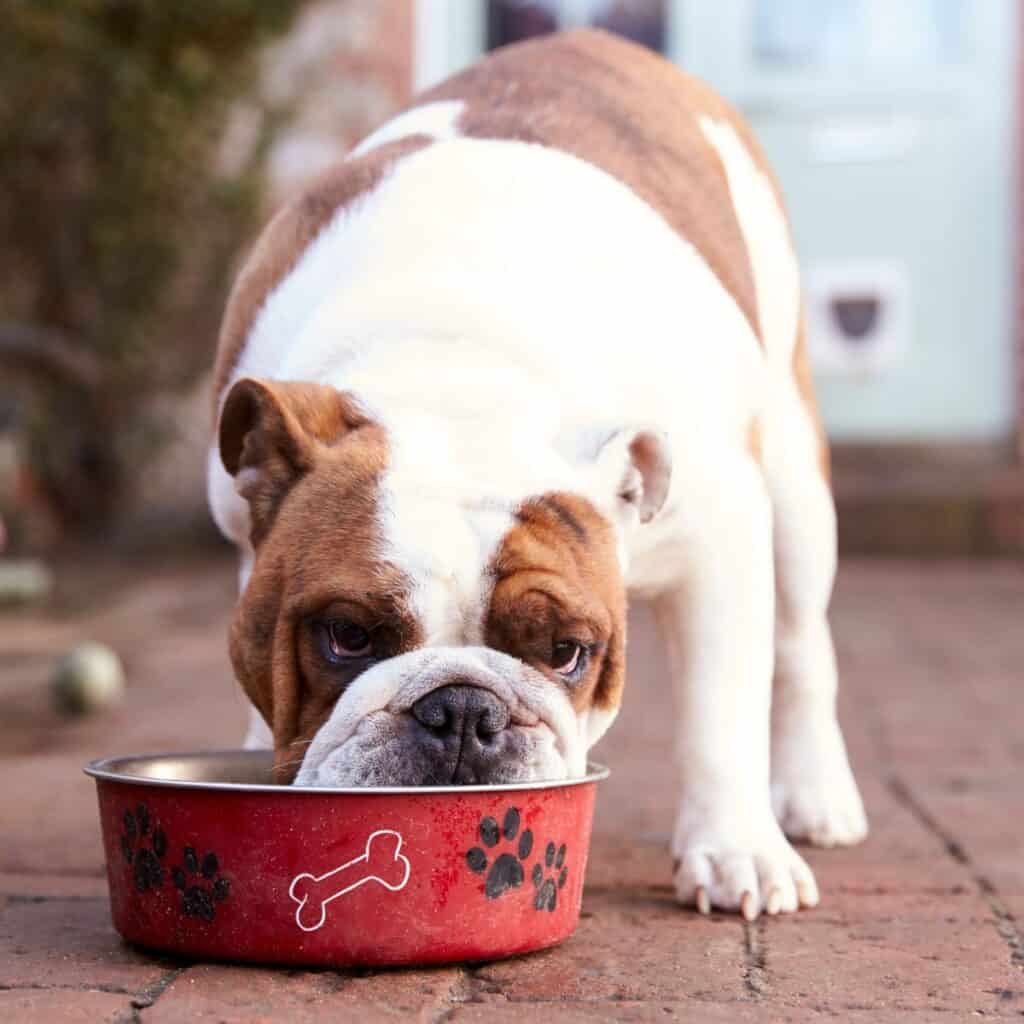Many pet parents understandably get confused because they can’t find the exact answer to whether or not cloves are toxic to dogs. Cloves are a common spice used in human foods and herbal medications. Cloves are thought to have beneficial effects on dog and human health when used in small amounts with but at the same time are alleged to be toxic which makes it confusing as to whether you should feed cloves to dogs.

Although cloves have been used for centuries for health purposes and to flavor human food there is a debate when it comes to feeding your dogs cloves.
Are cloves safe for dogs?
Generally, most of the advice on the internet report that dogs should not eat cloves. Cloves are not part of a natural or traditional dog’s diet and cloves and products that contain clove oil are rich in a chemical compound known as “Eugenol” which can cause liver toxicity and damage if consumed in large quantities by dogs. However, there are numerous scientific studies done with cloves and dogs where cloves are used as a treatment of various ailments, accordingly, due to such studies cloves seem perfectly safe to treat a specific dog ailment in small amounts.
As a dog lover, it is very important for you to have adequate knowledge of foods that are safe for your dogs in order for your dog you remain healthy and fit. However, foods like cloves that are not a traditional part of a dogs diet may be difficult to discern whether or not they are healthy for your dog to consume in small quantities.
See also Can I share my Spicy Food With My dog: Can dog’s eat jalapenos?
What the Veterinarians say about cloves
Many veterinarians don’t recommend giving cloves or clove oil products to dogs at all. There are some vets who disagree and simply recommend that large doses of cloves are avoided. These vets state that feeding minuscule quantities of cloves and clove oil occasionally can be beneficial for dogs due to the presence of antibacterial properties which can ward off infections and fight disease and for cloves anti-inflammatory properties. Along with these benefits, cloves can also help freshen the breath of your dog, strengthen its immune system, and improve digestion.

What Are Cloves?
According to Masterclass, cloves are derived from the flower buds of Syzygium aromaticum, an evergreen tree in the myrtle plant family, cloves are a powerfully aromatic spice that resemble a tiny tack. Named after the French word “clou,” meaning “nail,” cloves are a popular spice around the world and are used in a wide range of international cuisines.
Whereas, clove oil, is the extracted, concentrated product from the plant and clove powder is a pulverized powdered form of cloves.
What Foods Contain Cloves?
Most pet lovers share their human food their dogs so it is important to know where cloves are typically used in a human diet so your dog’s food is not affected.

Cloves are commonly used in spice blends for meat rubs and marinades, including the popular blends Chinese five-spice powder and garam masala.
They’re one of many spices used to make Vietnamese pho, and they stud whole-baked hams and pots of German braised red cabbage.
One of the most common uses of this aromatic spice is flavoring hot drinks, like mulled wine, Masala chai tea, and hot apple cider. Another is flavoring sweet dishes like stewed apples and pears, pumpkin pie, and gingerbread where cloves are usually found along with pumpkin spice
Cloves are also a main ingredient in Worcestershire sauce, and are commonly used to add sweetness and spice to other sauces, jams, and pickling mixtures. Whole cloves are typically removed from beverages, sauces, and other recipes before serving.
Many of these foods are not those typically shared by dog owners with our pets nor are cloves usually found in large amounts in these foods so cloves may not present as big of a danger as they otherwise would if they were a more common spice used with pet owners favorite foods that they like to share with their pets.
Review of Scientific Research Dog Studies and Cloves
Due to the purported benefits to dog’s health and antibacterial nature of cloves (similar to tea tree oil) scientists have undertaken some studies on the beneficial effects of cloves.
- In a scientific journal article in Pharmanutrition scientists evaluated the anti-inflammatory and antipyretic properties of clove oil in dogs. So thirty adult male dogs were used. After a surgical incision on the abdominal area, animals were divided into four group. The first group received 25 mg/kg of clove oil while the second group was considered as a control and the other groups were provided various pharmaceutical. Interestingly, the scientists determined that:
- Clove oil treatment in dogs after surgery decreased the number of white blood cells such as neutrophils.
- Rectal temperature significantly decreased in the clove oil-treated group as compared to control after surgery.
- Clove oil-treatment significantly reduced the number of inflammatory cells in surgical area as compared to control after surgery reducing oxidative damage.
- Clove oil administration has anti-inflammatory and antipyretic properties in dogs after surgery.
- In another study published in the Archives of Animal Nutrition scientists aimed to produce dog food containing natural antioxidants (blend of blend of essential oils from clove, rosemary, oregano, and vitamin E) to replace synthetic antioxidants and determine the effects on food conservation and animal health sequentially. The foods were produced in a commercial factory, and the antioxidants were added at the oil bath stage. Ten adult beagle dogs were used, divided into two treatments; control treatment (CON; synthetic antioxidant feed [butylhydroxytoluene]) and test treatment (NAT; natural antioxidant feed; blend of essential oils from clove, rosemary, oregano, and vitamin E).
- It was concluded that natural antioxidants in dog feed, in addition to promoting feed conservation, stimulate levels of systemic antioxidants and minimize the impacts caused by free radicals in the dogs’ blood.
- In another study, published in the world small animal congress from 2007 researchers attempted to assess the ability of cloves to reduce fever in dogs. 16 adult male mixed dogs, weighing 15-20 kg, were selected and observed for three weeks to assess their general health. Then, after general anesthesia and preparation of the dogs, and following an experimental surgery, 12 dogs that had developed fever without administration of antibiotics, were randomly divided into four groups, each of three dogs. The first group was injected by clove oil 10 mg /kg, the second group by acetaminophen 10 mg/kg, the third by clove oil 20 mg/kg, and the last group (control group) by normal saline 2 ml. Each 5 minutes, for three succeeding hours, their temperature was measured rectally by a digital thermometer.
- The results of this study, revealed that clove oil has a specific antipyretic in balancing the natural temperature of body and even once injected in double dose to the febrile dogs its effects are comparable to standard acetaminophen.

Benefits of Cloves for Dogs
Cloves have many benefits for humans and dogs as the scientific studies clearly show. Although cloves contain a considerable amount of volatile oily essence that some thought to be dangerous to dogs science shows that cloves can be used as energizer, appetite stimulant, disinfectant of wounds, alleviate fever, recover from surgery.
Many people also use cloves to combat bad breath and to put on a tooth ache. In fact when dentistry was not readily available people were known to pack a tooth with a clove to remedy severe cases of tooth issues.
How Many Cloves Can Cause Serious Danger For Your Dog?
How many cloves your pet may consume without serious danger depends upon the age and bodyweight of your dog. Generally, a dog would need to consume a high doses of cloves before anything can happen.
If we look at the scientific studies where cloves were used for their beneficial effects the dogs received between 10 and 20 ml of concentrated clove oil. According to the Asian Pacific Tropical Journal, a science journal that studied clove oil, concentrations up to 18% of essential oil can be found in the clove flower buds. Roughly, 89% of the clove essential oil is eugenol and 5% to 15% is eugenol acetate and β-cariofileno.
Accordingly, if your adult dog consumes small doses like one or two cloves it should not be cause to worry as that little will not put your dog at risk. Although few cloves are enough to cause toxic effects in puppies.
Make sure you keep away any food products that contain cloves or clove oil away from puppies and if puppies do get into cloves you should call the pet poison helpline as the risk of toxicity to puppies is far greater.
Many pet owners simply desire to stay on the safe side and avoid cloves altogether despite the beneficial effects, which is understandable.

What Happens to Dogs That Consume Too Many Cloves?
If your dog does consume too many cloves or, far more likely too much concentrated clove oil, they may suffer upset stomach, gastrointestinal tract distress and resulting high blood pressure which are signs that your dog may be suffering from clove toxicity these symptoms may progress to include irregular heartbeat (arrhythmia), low body temperature, difficulty breathing, vomiting, nervous dysfunction affecting the hind limbs due to the effect on the nervous system, and even death.
However, again your dog would have to have consumed a large amount of cloves. Numerous scientific studies show that many dogs receive concentrated amount of cloves with beneficial effects.
Conclusion
Eating cloves for dogs is a topic still under debate. Many pet owners do not think feeding cloves is a good idea and instead just elect to play it safe and avoid cloves altogether while simply avoiding such foods that dogs don’t generally eat anyway.
Even though there are many beneficial effects from cloves many still you can’t overlook the risk of liver damage. Added to this that the sensitivity level of every dog is different if feeding cloves to one dog proved beneficial it may not work for every individual. In the end, it is best advised to feed recommended foods to your pets so they can live healthy lives and always consult a veterinarian if your pet is showing signs of toxicity and keep the dental chews to some greenies for dog dental care as opposed to cloves to avoid serious problems.
Cloves and Dogs FAQs
Many vets say that cloves are dangerous to dogs and they should not have any but cloves have various benefits and certain other professionals and scientific studies indicate that dogs can have a very small amount of cloves. In one scientific study dogs were given 10-20ml of clove oil.
Eugenol is the toxic part of a clove and it there are several scientific studies that indicate when it is toxic to dogs. Dogs should only consume a very small amount of Eugenol, it is clear from the studies that 100ml of clove oil is toxic to dogs but dogs could manage 10-20ml of clove oil.
Cloves are at high levels toxic to dogs if your dog consumes a high level (above 10-20ml of clove oil) they may experience upset stomach, gastrointestinal tract distress and resulting high blood pressure which are signs that your dog may be suffering from clove toxicity these symptoms may progress to include irregular heartbeat (arrhythmia), low body temperature, difficulty breathing, vomiting, nervous dysfunction affecting the hind limbs due to the effect on the nervous system, and even death.

